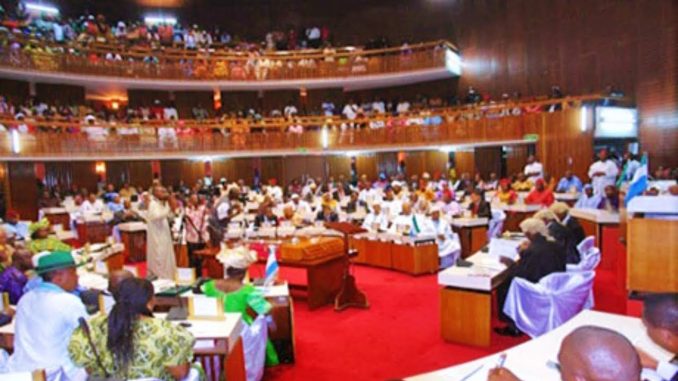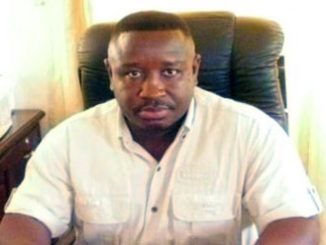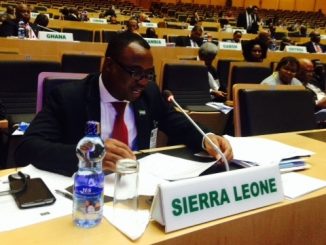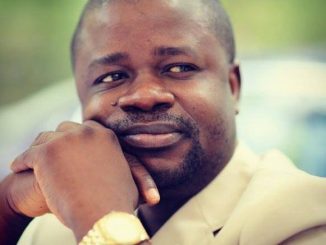
By Victor Mengot
The 2018 Elections in Sierra Leone was the most closely contested elections since independence in 1961. No presidential candidate received the 55% of the vote required to win in the first round, meaning a second round of voting was held on 31 March between the top two candidates, opposition leader Julius Maada Bio of the Sierra Leone People’s Party and Samura Kamara of the ruling All People’s Congress; the two were separated by under 15,000 votes in the first round. Julius Maada Bio was subsequently elected with 51.8% of the vote while the APC candidate Samura Kamara garnered 48.2% of the total votes casts.
In the Parliamentary elections the APC party was the leading party with 69 seats followed by SLPP 49, Coalition for Change (C4C) 8, National Grand Coalition 4, and Independents 3. By tradition, there are 14 Paramount Chiefs in Parliament representing the Districts from all the regions.
The first Session of Parliament was full of controversy following petitions affecting the Members of the two leading parties, although the APC Party was more affected with an Injunction placed on 16 of its Members of Parliament. This led to a walk out by APC party Members after some skirmishes in the Well of Parliament that prompted the Clerk of Parliament to seek assistance from the Police to remove them from the premises. Whether the action of the Clerk was justifiable depends on the views from both sides of the political divide and that is a matter for debate at another moment. It took the intervention of Representatives from the ECOWAS Parliament to get the APC MPs to return to Parliament and take the oath of Office by which time further proceedings in Parliament had already taken place with the election of the Speaker and Deputy Speaker, positions that was captured by the SLPP.
The current Speaker of Parliament, Hon. Dr. Abass Chernor Bundu on Thursday 26th April 2018 called on the large opposition bloc of the All Peoples Congress Party to reason and come forward to subscribe to the Oath of Office for MPs, before they could enter their official duties in the House. He also said that “it behoves them to do so because it is a duty they owed to both their constituents and the country”. This is despite the fact that Parliament had proceeded with the formation of the Public appointment Committee responsible for the vetting and approval of the newly nominated Cabinet Ministers and the Committee of Selection chaired by the Speaker himself. The other Members of the Committee of Selection are:
• Leader of Government Business (SLPP) Hon. Mohamed Sidi Tunis;
• Leader of the Opposition (APC);
• Hon. Saa Emerson Lamina (C4C);
• Hon. Alhaji Dr. Kandeh Kolleh Yumkella (NGC);
• Hon. PC Alie B. Marrah III;
• Hon. Quintin Salia Konneh (Independent);
• Hon. Veronica K. Sesay (SLPP); and
• the Clerk of Parliament, Hon. Umar Paran Tarawally who also serves as the Secretary to the Committee.
It is unlikely that the above decisions that have been ratified by Parliament will be reversed in the interest of compromise as was recommended by the Mediators form the ECOWAS Parliament after the impasse between the leading parties. This is evident in the reaction by the Deputy Leader of the APC Party Hon. Ibrahim Bundu following the approval of some Cabinet Ministers. He stated that the APC could not lend credence and do justice to the debate because they did not take part in the screening process but recognized the nominees as “patriotic Sierra Leoneans”.
It is against this backdrop that the SLPW is of the opinion that the APC Party should fulfil its mandate by taking active part in the proceedings in Parliament in the interest of the electorate. This is because they are representing almost 50% of the electorate whose wishes and that of the interest of entire nation of Sierra Leone must be protected through an effective opposition in Parliament.
The Leader of the APC Party is already a Member of the Committee of Selection responsible for appointing MPs into the various Committees in the House, subject to approval, and also for supervising the conduct of those Committees in the discharge of their duties. More importantly, the APC Party based on its numerical strength in Parliament is likely to be in control of Some of the Departmental Select Committees. The role of Departmental Committees is to examine the ‘expenditure, administration and policy’ of the relevant government department and its ‘associated public bodies’. Those public bodies include, for example, the Sierra Leone Road Safety Authority SLRSA; NASSIT; Road Maintenance Fund Administration: National Revenue Authority; and Regulatory Bodies such as NATCOM and the Anti-Corruption Commission (ACC).
Committees decide upon their own subjects for inquiry within the broad scope of their remit. They seek written evidence from people and organisations with an interest in their inquiries, and anyone can submit such evidence to the inquiry. The committees will usually also invite a selection of witnesses to give oral evidence. The cross-examination of witnesses takes place in public. The government department will usually be asked to produce detailed written evidence on all aspects of the subject being examined and the Minister responsible will normally be asked to give oral evidence on the topic. In in the interest of the electorate, these Committees should be proactive in scrutinizing the Executive rather than responding to issues on an ad hoc basis as was done in the past regarding issues such as the Ebola Crisis; Boundary Delimitation; Mudslide Disaster and Hajjgate, to name but a few.
One of the most important Committee is Parliament is the Committee of Ways and Means. The Ways and Means Committee is a government body that is charged with reviewing and making recommendations for government budgets. The term “ways and means” originated with the English Parliament (later the British Parliament and UK Parliament) and refers to the provision of revenue to meet national expenditure requirements and to implement the objectives of economic policy. Ways and means are principally provided by the imposition of taxation. Because the raising of revenue is vital to carrying out governmental operations, such a committee is literally tasked with finding the ways and means with which to raise that revenue. The APC party should play an active part in the operation of this Committee and it will also be a good gesture on the part of the ruling party if such a Committee was chaired by a member of one of the opposition parties.
Now that most of the Cabinet Ministers have been approved, the APC Members in Parliament should consider the idea of forming a ‘Shadow Cabinet’ to monitor the activities of the new Ministers and be in a position to raise important issues relating to their portfolio in the floor of the House. They should be seen as a group of prominent opposition MPs who are likely to hold positions in the Cabinet if and when the APC Party assumes the power of the Executive following the subsequent elections. The SLPP waited patiently for 10 years before regaining power and judging by their recent appointments the new Cabinet Members will have to cover a lot of grounds to realize the visions in the ‘New Direction’ Manifesto. Moreover, 80% of the MPs elected to the Fifth Parliament are new Members and that means that both the Executive and the Legislature will need a lot of support and collaboration if they were to perform their duties effectively.
“A democracy operates on the basis that there is room for choice all the way up to the selection of the government. This implies that the legislature, which makes the laws for the country, must itself provide an opportunity for various views to be heard throughout the term. These views should encompass not only those on the government benches (some of whom may want to suggest variations in procedure to those envisaged by the Ministers in the Cabinet), but also those who are opposed to the policies underlying the ways of operation. In other words, lawfully elected representatives of the people must be able to present and discuss alternative policy options even if they are not part of the government and do not have an immediate way of making their plans succeed”. (Culled from the Commonwealth view on Democratic Government)
One of the main functions of the opposition is its work in scrutinizing the operations of the executive, that is, exercising the oversight of the implementation of the law from the angle of performance and accountability and, especially, the use of the finances granted to the executive for its work. This is perhaps where an opposition can not only make a sound contribution towards the efficient running of the country but also can make its own points and demonstrate how their policies might have achieved better results.
Finally, an outstanding contribution of effective opposition to democracy is that it educates the people of the land on politics matters and assures active and intelligent participation of the people in public affairs. Lindsay, the well-known commentator, says, “The democratic problem is the control of the organization of power by the common man.” The citizens of a democratic country must be ‘thinking men and women’, possessing Independent opinions and capable of taking intelligent interest in public affairs. Without edu¬cation there can be no intelligent discussion and participation in the processes of the government. Education produces rational human beings, having the power of discriminate between good and bad.



